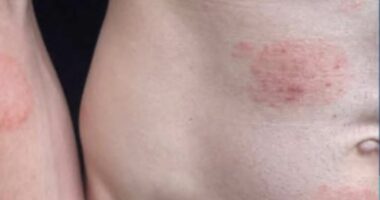Share this @internewscast.com
What happens when your immune system turns against your own body?
Autoimmune diseases frequently cause confusion, particularly when they impact something as crucial as the thyroid. Two conditions that often arise in discussion are Graves’ Disease and Hashimoto Thyroiditis.
Initially, these conditions might appear alike since they both involve the thyroid gland and are caused by an immune system malfunction. However, the effects they have on the body are vastly different.
The distinction between Graves’ Disease and Hashimoto Thyroiditis goes beyond simply being hyperthyroid or hypothyroid; it also concerns how the immune system prompts diverse changes within the body.
Understanding these two conditions is very important because the wrong treatment can create bigger health issues.
Now, let us move forward and break down everything you must know.
Graves’ Disease vs Hashimoto Thyroiditis: What Really Sets Them Apart?
Graves’ Disease vs Hashimoto Thyroiditis — though both are autoimmune disorders, but have opposite effects on thyroid function..
Graves’ disease speeds up the thyroid, causing too much hormone production.
Hashimoto thyroiditis slows it down, leading to low hormone levels.
In Graves’ disease, the immune system creates substances called thyroid-stimulating immunoglobulins (TSI).
These substances stick to thyroid receptors and tell the thyroid to keep making hormones, even when the body does not need them. Research shows that genetic predisposition contributes to about 79% of the risk of developing Graves’ Disease.
In Hashimoto thyroiditis, the immune system slowly damages the thyroid cells. Over time, the thyroid cannot make enough hormones. This leads to hypothyroidism.
Both these conditions need very different approaches for treatment, and missing the early symptoms could create more trouble.
Graves or Hashimoto? Spot the Symptoms Early
Recognising the symptoms early can save you from many complications. Graves’ Disease mostly shows up as signs of hyperactivity in the body. On the other hand, Hashimoto Thyroiditis makes everything slow down.
Common Symptoms of Graves’ Disease:
- Sudden weight loss without dieting
- Faster heartbeats even at rest
- Anxiety and nervousness
- Shaking hands
- Excessive sweating even in cool weather
- Trouble sleeping
- More frequent bowel movements
- Eye problems like bulging or irritation
- Bigger thyroid (goitre)
Some people even develop Graves’ Eye Disease, where their eyes bulge and vision becomes blurry. This happens in about one-third of Graves patients.
Common Symptoms of Hashimoto’s Thyroiditis:
- Tiredness all the time
- Unexpected weight gain
- Feeling cold easily
- Joint and muscle pains
- Slow heart rate
- Puffy face
- Dry and pale skin
- Depression and mood swings
- Irregular periods
- Hoarse voice
- Constipation
Sometimes, Hashimoto’s symptoms can appear slowly, making it hard to notice until the thyroid is already badly damaged.
Graves’ Disease vs Hashimoto Thyroiditis: Comparison Table
|
Feature |
Graves Disease |
Hashimoto Thyroiditis |
|
Type of thyroid problem |
Overactive thyroid (Hyperthyroidism) |
Underactive thyroid (Hypothyroidism) |
|
Main immune action |
Stimulates thyroid cells to overproduce |
Attacks thyroid cells, causing damage |
|
Age commonly affected |
30 years and older |
30–50 years, can occur earlier |
|
Gender more affected |
Females more than males |
Females more than males |
|
Eye problems |
Common (Graves’ eye disease) |
Rare |
|
Weight effect |
Weight loss |
Weight gain |
|
Treatment |
Lower thyroid hormone production |
Replace missing thyroid hormone |
What Causes These Thyroid Disorders?
The exact reasons why the immune system behaves this way are not clear.
Still, experts believe that genes combined with environmental triggers cause these thyroid problems.
Causes of Graves’ Disease:
- Overproduction of TSI antibodies
- Genetic risk (up to 79%)
Causes of Hashimoto’s Thyroiditis:
- Gradual destruction of thyroid cells by the immune system
- Strong link with other autoimmune conditions
Several factors that can trigger these conditions include:
- Viral infections
- Radiation exposure
- Too much iodine intake
- Stress
- Family history
- Certain medicines used in mental health conditions
Sometimes, simple things like living in a polluted area or poor lifestyle choices can worsen the risk.
How Doctors Diagnose: Graves or Hashimoto?
Doctors have smart techniques to figure out if it is Graves’ Disease or Hashimoto Thyroiditis. They start with symptoms and a physical check for goitre or eye problems. Next, they order blood tests to check thyroid hormone levels like TSH, T3, and T4. They also test for antibodies like TSI (for Graves) or TPO (for Hashimoto).
If things are still unclear, doctors may order:
- Radioactive iodine uptake tests
- Thyroid scans
- Ultrasounds
- Needle biopsies if they find lumps
Proper diagnosis is important. Wrong diagnosis can delay correct treatment and cause serious health risks later.
How Treatment Differs Between Graves’ Disease and Hashimoto’s Thyroiditis
Treatment depends on whether the thyroid is overactive or underactive.
Graves’ Disease Treatment:
- Antithyroid Medicines: Drugs like methimazole or propylthiouracil stop the thyroid from making too much hormone.
- Radioactive Iodine Therapy: This safely destroys parts of the thyroid, slowing down hormone production.
- Surgery: If the goitre is too big or medicines don’t work, doctors may remove part or all of the thyroid.
- Beta-blockers: Sometimes used to manage rapid heartbeat or anxiety until hormone levels come down.
Many people also have to manage eye problems separately through artificial tears or eye surgeries.
Hashimoto’s Thyroiditis Treatment:
- Thyroid Hormone Replacement: Doctors prescribe levothyroxine, a synthetic thyroid hormone.
- Regular Blood Tests: Needed to keep thyroid hormone levels within normal range.
- Dietary Changes: Avoiding soy and calcium-rich foods near medicine timing can help absorption.
- Monitoring for Progression: Even early stages without clear hypothyroidism need monitoring.
Each treatment needs regular follow-up to adjust doses and check for symptoms.
What Happens If You Ignore These Conditions?
If you ignore these diseases, things can get very bad very fast.
Graves’ Disease Complications:
- Heart problems like atrial fibrillation
- Weak bones leading to osteoporosis
- Muscle wastage
- Pregnancy complications
- Life-threatening thyroid storm
Hashimoto Thyroiditis Complications:
- Heart failure due to a slow heartbeat
- Severe depression
- Goitre causing breathing trouble
- Problems during pregnancy, like birth defects
- Myxedema, a rare but fatal condition
Early treatment can easily prevent most of these complications.
Conclusion
Graves’ Disease and Hashimoto’s Thyroiditis both affect the thyroid and immune system but in opposite ways. Graves’ pushes the thyroid into overdrive, while Hashimoto’s causes it to slow down over time.
These conditions can impact energy, mood, weight, and overall health. Recognizing the signs early and getting a proper diagnosis is essential.
With timely treatment and the right lifestyle choices, you can manage symptoms and protect your well-being. Don’t ignore changes in how you feel, fatigue, anxiety, or weight shifts could be signs. If you suspect thyroid issues, don’t wait. Talk to your doctor today and take control of your health.
FAQs
1. Can Graves’ Disease turn into Hashimoto Thyroiditis?
Sometimes yes. Long-term damage from Graves’ treatments, like radioactive iodine, can eventually lead to hypothyroidism like Hashimoto’s.
2. Is Hashimoto’s always caused by genetics?
No, while family history increases risk, factors like infections, stress, and diet also matter.
3. Can you prevent Graves’ Disease or Hashimoto Thyroiditis?
There is no sure way to prevent them. But living a healthy lifestyle and managing stress might lower the risk.
4. How often should thyroid levels be checked once diagnosed?
Doctors usually recommend checking every 6–12 months or whenever symptoms change.
5. Does diet help in managing these diseases?
Yes, iodine intake must be balanced. Also, gluten-free diets are sometimes suggested for Hashimoto’s, but only under a doctor’s guidance.

















